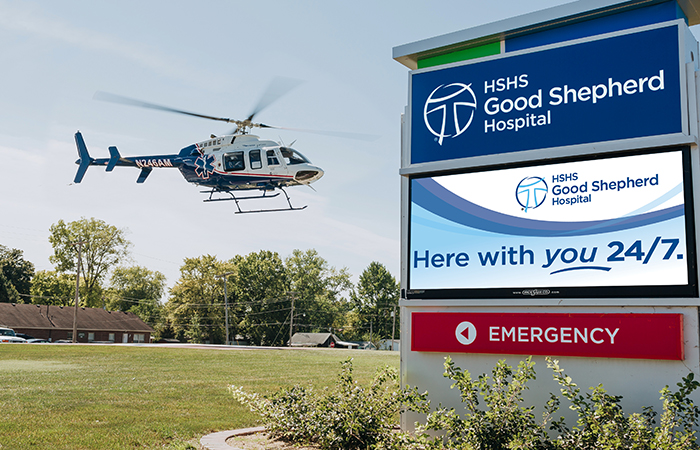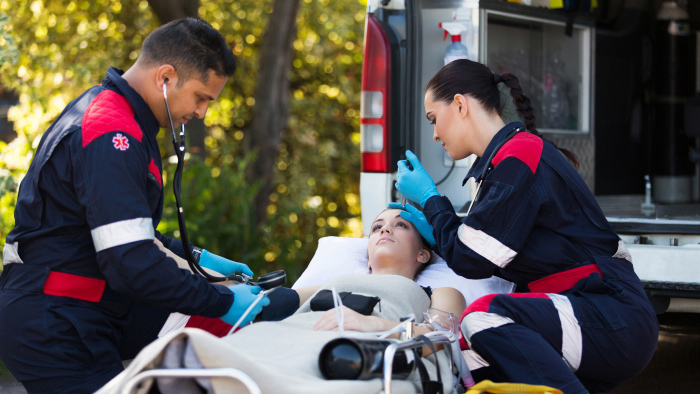Life can change in an instant. That’s why our board-certified emergency physicians are always ready. With advanced treatments and world-class cardiologists, we’re prepared for the worst – so you can count on the best care when it matters most.
Emergency Care
When emergencies happen you want the best care as quickly as possible. That's why HSHS Good Shepherd Hospital in Shelbyville is ready 24/7. Our emergency department offers all private rooms, a private waiting area and an updated radiology department.

Here with you when it matters most
Emergency services provide care to people suffering injuries ranging from a fractured bone to a heart attack or stroke. Our emergency department is staffed with board certified emergency medicine physicians, nurses, and other medical experts who handle a variety of conditions.
We also work closely with the Prairie Heart Institute to provide the Stat Heart program.
Pediatric Emergency Center
Compassionate in an Emergency.
A child in need of emergency care can be a parent’s worst fear. The team at HSHS Good Shepherd made Julie and her daughter feel safe and cared for during a recent medical scare. Watch as she expresses her gratefulness for the compassion they experienced.
Children have unique medical problems and may display different symptoms than adults. Symptoms that are serious for a child may not be as serious for an adult. Children may also be unable to communicate their condition, which means an adult will have to interpret the behavior. When it comes to your child or a child under your care, seek immediate medical attention if you think they are having a medical emergency.
Medical emergencies are unexpected events and knowing that an experienced health care team is available around the clock and close to home should take the worry out of dealing with them when they occur.
New ER. Investing in You.
From serious conditions like a heart attack to accidents like a broken bone, our physicians and nurses are highly trained and ready to take care of your loved ones of all ages. The nursing team is certified in cardiac life support, pediatric life support and trauma. We also work closely with the Prairie Heart Institute to provide the Stat Heart Program.
When in doubt, check it out
So how do you decide when a medical condition rises to the level of a medical “emergency?” First, always consider dialing 911 if you need urgent help and please teach young children how and when to dial these three very important numbers as well. If you or a loved one experiences any of the following conditions or symptoms, the Emergency Department is likely the place you need to be.
- Difficulty breathing, shortness of breath
- Chest or upper abdominal pain or pressure
- Fainting, sudden dizziness, weakness
- Changes in vision
- Confusion or changes in mental status
- Any sudden or severe pain
- Uncontrolled bleeding
- Severe or persistent vomiting or diarrhea
- Coughing or vomiting blood
- Suicidal feelings
- Difficulty speaking
- Shortness of breath
- Unusual abdominal pain
Some things you might have to answer questions about in an emergency department:
- Medications you are on
- Any prescription medication or food allergies you may have
- If immunizations are up-to-date
- Your health history and any surgeries you have had
Also remember:
- Remain calm
- Patients are seen in the emergency room based on the severity of the illness or injury, not on a first-come, first-served basis.

Stat Heart Program
The Stat Heart Program streamlines emergency heart care to meet the national goal of providing angioplasty (a non-surgical procedure to treat diseased arteries) within 90 to 120 minutes from a patient’s arrival at the hospital.
When a suspected heart attack patient arrives in the HSHS Good Shepherd emergency oom, an overhead announcement alerts representatives from lab, radiology, cardiopulmonary and ICU, as well as key nursing staff, to respond to the ER. If a heart attack is confirmed the patient is transferred to a hospital with a cardiac catheterization lab within 90 minutes of arrival.